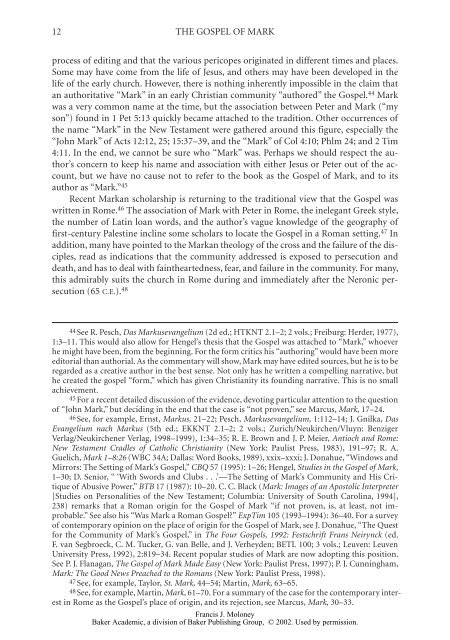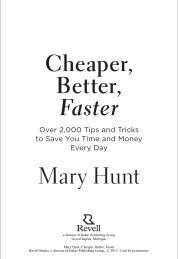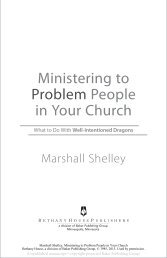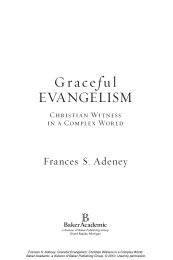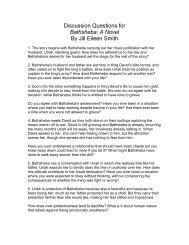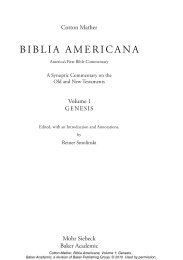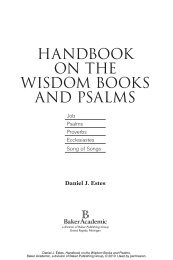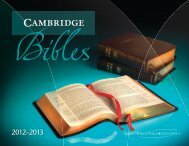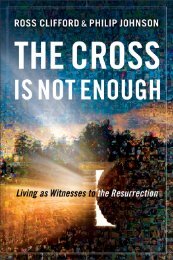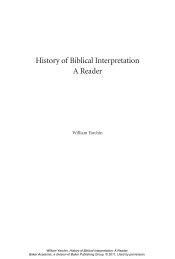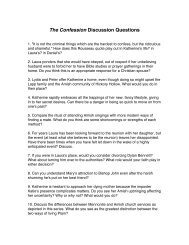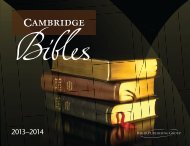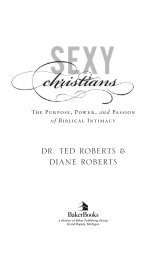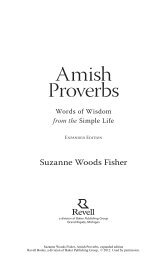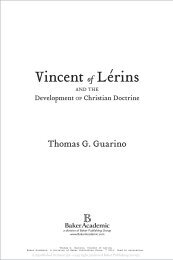the gospel of mark a commentary - Baker Publishing Group
the gospel of mark a commentary - Baker Publishing Group
the gospel of mark a commentary - Baker Publishing Group
You also want an ePaper? Increase the reach of your titles
YUMPU automatically turns print PDFs into web optimized ePapers that Google loves.
12 THE GOSPEL OF MARK<br />
process <strong>of</strong> editing and that <strong>the</strong> various pericopes originated in different times and places.<br />
Somemayhavecomefrom<strong>the</strong>life<strong>of</strong>Jesus,ando<strong>the</strong>rsmayhavebeendevelopedin<strong>the</strong><br />
life <strong>of</strong> <strong>the</strong> early church. However, <strong>the</strong>re is nothing inherently impossible in <strong>the</strong> claim that<br />
an authoritative “Mark” in an early Christian community “authored” <strong>the</strong> Gospel. 44 Mark<br />
wasaverycommonnameat<strong>the</strong>time,but<strong>the</strong>associationbetweenPeterandMark(“my<br />
son”) found in 1 Pet 5:13 quickly became attached to <strong>the</strong> tradition. O<strong>the</strong>r occurrences <strong>of</strong><br />
<strong>the</strong> name “Mark” in <strong>the</strong> New Testament were ga<strong>the</strong>red around this figure, especially <strong>the</strong><br />
“John Mark” <strong>of</strong> Acts 12:12, 25; 15:37–39, and <strong>the</strong> “Mark” <strong>of</strong> Col 4:10; Phlm 24; and 2 Tim<br />
4:11. In <strong>the</strong> end, we cannot be sure who “Mark” was. Perhaps we should respect <strong>the</strong> author’s<br />
concern to keep his name and association with ei<strong>the</strong>r Jesus or Peter out <strong>of</strong> <strong>the</strong> account,<br />
but we have no cause not to refer to <strong>the</strong> book as <strong>the</strong> Gospel <strong>of</strong> Mark, and to its<br />
author as “Mark.” 45<br />
Recent Markan scholarship is returning to <strong>the</strong> traditional view that <strong>the</strong> Gospel was<br />
writteninRome. 46 The association <strong>of</strong> Mark with Peter in Rome, <strong>the</strong> inelegant Greek style,<br />
<strong>the</strong> number <strong>of</strong> Latin loan words, and <strong>the</strong> author’s vague knowledge <strong>of</strong> <strong>the</strong> geography <strong>of</strong><br />
first-century Palestine incline some scholars to locate <strong>the</strong> Gospel in a Roman setting. 47 In<br />
addition, many have pointed to <strong>the</strong> Markan <strong>the</strong>ology <strong>of</strong> <strong>the</strong> cross and <strong>the</strong> failure <strong>of</strong> <strong>the</strong> disciples,<br />
read as indications that <strong>the</strong> community addressed is exposed to persecution and<br />
death, and has to deal with fain<strong>the</strong>artedness, fear, and failure in <strong>the</strong> community. For many,<br />
this admirably suits <strong>the</strong> church in Rome during and immediately after <strong>the</strong> Neronic persecution<br />
(65 C.E.). 48<br />
44See R. Pesch, Das Markusevangelium (2d ed.; HTKNT 2.1–2; 2 vols.; Freiburg: Herder, 1977),<br />
1:3–11. This would also allow for Hengel’s <strong>the</strong>sis that <strong>the</strong> Gospel was attached to “Mark,” whoever<br />
he might have been, from <strong>the</strong> beginning. For <strong>the</strong> form critics his “authoring” would have been more<br />
editorial than authorial. As <strong>the</strong> <strong>commentary</strong> will show, Mark may have edited sources, but he is to be<br />
regarded as a creative author in <strong>the</strong> best sense. Not only has he written a compelling narrative, but<br />
he created <strong>the</strong> <strong>gospel</strong> “form,” which has given Christianity its founding narrative. This is no small<br />
achievement.<br />
45For a recent detailed discussion <strong>of</strong> <strong>the</strong> evidence, devoting particular attention to <strong>the</strong> question<br />
<strong>of</strong> “John Mark,” but deciding in <strong>the</strong> end that <strong>the</strong> case is “not proven,” see Marcus, Mark, 17–24.<br />
46See, for example, Ernst, Markus, 21–22; Pesch, Markusevangelium, 1:112–14; J. Gnilka, Das<br />
Evangelium nach Markus (5th ed.; EKKNT 2.1–2; 2 vols.; Zurich/Neukirchen/Vluyn: Benziger<br />
Verlag/Neukirchener Verlag, 1998–1999), 1:34–35; R. E. Brown and J. P. Meier, Antioch and Rome:<br />
New Testament Cradles <strong>of</strong> Catholic Christianity (New York: Paulist Press, 1983), 191–97; R. A.<br />
Guelich, Mark 1–8:26 (WBC 34A; Dallas: Word Books, 1989), xxix–xxxi; J. Donahue, “Windows and<br />
Mirrors: The Setting <strong>of</strong> Mark’s Gospel,” CBQ 57 (1995): 1–26; Hengel, Studies in <strong>the</strong> Gospel <strong>of</strong> Mark,<br />
1–30; D. Senior, “ ‘With Swords and Clubs . . .’—The Setting <strong>of</strong> Mark’s Community and His Critique<br />
<strong>of</strong> Abusive Power,” BTB 17 (1987): 10–20. C. C. Black (Mark: Images <strong>of</strong> an Apostolic Interpreter<br />
[Studies on Personalities <strong>of</strong> <strong>the</strong> New Testament; Columbia: University <strong>of</strong> South Carolina, 1994],<br />
238) re<strong>mark</strong>s that a Roman origin for <strong>the</strong> Gospel <strong>of</strong> Mark “if not proven, is, at least, not improbable.”<br />
See also his “Was Mark a Roman Gospel?” ExpTim 105 (1993–1994): 36–40. For a survey<br />
<strong>of</strong> contemporary opinion on <strong>the</strong> place <strong>of</strong> origin for <strong>the</strong> Gospel <strong>of</strong> Mark, see J. Donahue, “The Quest<br />
for<strong>the</strong>Community<strong>of</strong>Mark’sGospel,”inThe Four Gospels, 1992: Festschrift Frans Neirynck (ed.<br />
F. van Segbroeck, C. M. Tucker, G. van Belle, and J. Verheyden; BETL 100; 3 vols.; Leuven: Leuven<br />
University Press, 1992), 2:819–34. Recent popular studies <strong>of</strong> Mark are now adopting this position.<br />
SeeP.J.Flanagan,The Gospel <strong>of</strong> Mark Made Easy (New York: Paulist Press, 1997); P. J. Cunningham,<br />
Mark: The Good News Preached to <strong>the</strong> Romans (New York: Paulist Press, 1998).<br />
47See, for example, Taylor, St. Mark, 44–54; Martin, Mark, 63–65.<br />
48See, for example, Martin, Mark, 61–70. For a summary <strong>of</strong> <strong>the</strong> case for <strong>the</strong> contemporary interest<br />
in Rome as <strong>the</strong> Gospel’s place <strong>of</strong> origin, and its rejection, see Marcus, Mark, 30–33.<br />
Francis J. Moloney<br />
<strong>Baker</strong> Academic, a division <strong>of</strong> <strong>Baker</strong> <strong>Publishing</strong> <strong>Group</strong>, © 2002. Used by permission.


